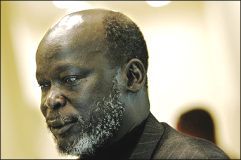Darfur rebels reject Garang offer of peacekeeping troops
CAIRO, Feb 13 (AFP) — One of the two main ethnic minority rebel groups in Darfur Sunday rejected an offer by former southern rebels of the Sudan People’s Liberation Movement to provide peacekeeping troops for the war-wracked region.
 “The Sudan Liberation Army is the only force capable of and responsible for protecting the people and region of Darfur,” its spokesman Mohammed Hamed Ali said.
“The Sudan Liberation Army is the only force capable of and responsible for protecting the people and region of Darfur,” its spokesman Mohammed Hamed Ali said.
Ali rejected SPLM leader John Garang’s proposal for a joint stabilisation force in Darfur made up of his militiamen, government troops and peacekeepers from the African Union.
“The Khartoum regime’s forces are the ones responsible for the tragedy in Darfur and committed most of the massacres in the region,” he said.
He charged that ever since their deployment last year, truce observers from the African Union had “sat idly by while government planes mounted air raids and the Janjaweed militias carried out massacres.”
A peacekeeping force should be made up of “UN troops because they have the capacity and necessary means to protect Darfur,” he said.
The rebel spokesman insisted that, despite his comments, he continued to hold the SPLM leader in “high esteem”.
He urged Garang to focus on “protecting implementation of the Naivasha accords,” the landmark peace deal the SPLM signed with the government last month, as the Khartoum regime was “renowned for its failure to abide by signed agreements.”
The African Union already has a small observer force of some 1,700 troops inside Darfur but, in a region the size of France, it has struggled to monitor a ceasefire that has been repeatedly violated since it was signed in April last year.
UN Secretary General Kofi Annan earlier this month proposed expanding the force to more than 10,000 troops and widening its mandate.
But Security Council discussions have been muddied by a dispute over jurisdiction in the serious abuses alleged against government security forces and allied militias in Darfur.
Tens of thousands of people have died and more than 1.5 million been displaced since the rebel uprising began in early 2003, prompting a scorched earth policy by the Arab-dominated regime in Khartoum.
